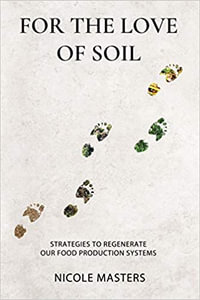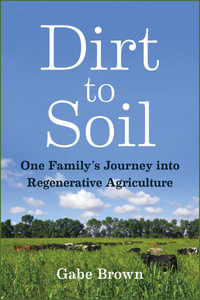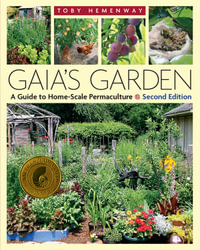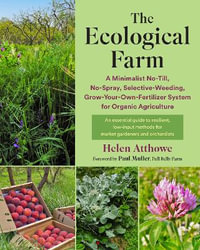
The Community Food Forest Handbook
How to Plan, Organize, and Nurture Edible Gathering Places
By: Catherine Bukowski, John Munsell, LaManda Joy (Foreword by)
Paperback | 12 July 2018
At a Glance
Paperback
Limited Stock Available
RRP $47.50
$45.25
When will this arrive by?
Collaboration and leadership strategies for long-term success
Fueled by the popularity of permaculture and agroecology, community food forests are capturing the imaginations of people in neighborhoods, towns, and cities across the United States. Along with community gardens and farmers markets, community food forests are an avenue toward creating access to nutritious food and promoting environmental sustainability where we live. Interest in installing them in public spaces is on the rise. People are the most vital component of community food forests, but while we know more than ever about how to design food forests, the ways in which to best organize and lead groups of people involved with these projects has received relatively little attention.
In The Community Food Forest Handbook, Catherine Bukowski and John Munsell dive into the civic aspects of community food forests, drawing on observations, group meetings, and interviews at over 20 projects across the country and their own experience creating and managing a food forest. They combine the stories and strategies gathered during their research with concepts of community development and project management to outline steps for creating lasting public food forests that positively impact communities.
Rather than rehash food forest design, which classic books such as Forest Gardening and Edible Forest Gardens address in great detail, The Community Food Forest Handbook uses systems thinking and draws on social change theory to focus on how to work with diverse groups of people when conceiving of, designing, and implementing a community food forest. To find practical ground, the authors use management phases to highlight the ebb and flow of community capitals from a project's inception to its completion. They also explore examples of positive feedbacks that are often unexpected but offer avenues for enhancing the success of a community food forest.
The Community Food Forest Handbook provides readers with helpful ideas for building and sustaining momentum, working with diverse public and private stakeholders, integrating assorted civic interests and visions within one project, creating safe and attractive sites, navigating community policies, positively affecting public perception, and managing site evolution and adaptation. Its concepts and examples showcase the complexities of community food forests, highlighting the human resilience of those who learn and experience what is possible when they collaborate on a shared vision for their community.
Industry Reviews
"The increased interest in botanical sanctuaries, forest gardens, and nurtured edible gathering places is a sign that many are seeking to rekindle our relationship with these spaces as caretakers in these modern times. Learning how to nurture food forests builds community resilience, engagement, health, and stewardship. The Community Food Forest Handbook is perfect for townships, urban planners, landscape designers, community organizers, land trusts, permaculture enthusiasts, and foragers who aspire to dig in and seed our future. Catherine Bukowski and John Munsell have created a timely, well-researched guide that provides plenty of hands-on tools for advocacy and implementation based on diverse case studies from across the country. In the spirit of Robert Hart's classic Forest Gardening, it gives hope to see the community food forest trend rapidly resurging."-Susan Leopold, executive director of United Plant Savers
"The Community Food Forest Handbook opens the door to a new, rapidly expanding approach to agroforestry in urban areas and communities. Rather than focus on the technical aspects of planting and production, Catherine Bukowski and John Munsell address sociological challenges inherent in planning and sustaining community food forests, as well as potential solutions. The result is a comprehensive resource for adapting practices traditionally applied to privately owned rural land for the enrichment of community-managed greenspaces."-Susan Stein, director of National Agroforestry Center of USDA Forest Service
"Wedding community renewal with agroecology, Bukowski and Munsell offer us a remarkably rich harvest of wisdom from a quarter of a century of insight and struggle in the community food forest movement. First fruits are everywhere consumed to nourish the spirit, reward unlikely heroes, and propitiate success. Partake of The Community Food Forest Handbook, and celebrate permaculture taking hold of America's imagination: from Seattle to Asheville, Syracuse to San Francisco, and in dozens of cities across the fruited plain, perennial culture is rising."-Peter Bane, president of Permaculture Institute of North America
"As communities seek both to grow food and to solve social and environmental problems, they need new insights into the ways in which people self-organize to initiate projects and sustain them in the long term. In The Community Food Forest Handbook, the authors offer a highly useful guide based on the collective wisdom of people and communities who are defining this practice as they develop it on the ground. The thoughtful analysis of planning strategies and numerous case studies of active projects help us all understand what community food forests are and can be for the future."-Steve Gabriel, author of Silvopasture and coauthor of Farming the Woods
"It's great to see a book about food forests / forest gardens which concentrates on community-scale projects. These need design and management not only for the growing system itself, but also for the human community that nurtures the forest and is often much neglected. The Community Food Forest Handbook does an excellent job of tackling the social issues and includes some highly informative case studies of community projects."-Martin Crawford, director of Agroforestry Research Trust; author of Trees for Gardens, Orchards, and Permaculture
ISBN: 9781603586443
ISBN-10: 160358644X
Published: 12th July 2018
Format: Paperback
Language: English
Number of Pages: 272
Audience: General Adult
Publisher: Chelsea Green Publishing Co
Country of Publication: US
Dimensions (cm): 24 x 19 x 2
Weight (kg): 0.59
Shipping
| Standard Shipping | Express Shipping | |
|---|---|---|
| Metro postcodes: | $9.99 | $14.95 |
| Regional postcodes: | $9.99 | $14.95 |
| Rural postcodes: | $9.99 | $14.95 |
How to return your order
At Booktopia, we offer hassle-free returns in accordance with our returns policy. If you wish to return an item, please get in touch with Booktopia Customer Care.
Additional postage charges may be applicable.
Defective items
If there is a problem with any of the items received for your order then the Booktopia Customer Care team is ready to assist you.
For more info please visit our Help Centre.
You Can Find This Book In
This product is categorised by
- Non-FictionArts & EntertainmentArchitectureLandscape Art & ArchitectureArchitectural Aspects of City & Town Planning
- Non-FictionGardeningGardening: Plants & Cultivation GuidesGardening: Growing Fruit & Vegetables
- Non-FictionEngineering & TechnologyAgriculture & FarmingSustainable Agriculture
- Non-FictionSociety & CultureCultural StudiesFood & Society
- Non-FictionEarth Sciences, Geography, Environment, PlanningRegional & Area PlanningUrban & Municipal Planning
- Non-FictionPolitics & GovernmentCentral GovernmentCentral Government Policies
- Non-FictionEarth Sciences, Geography, Environment, PlanningThe EnvironmentSustainability
- Non-FictionEngineering & TechnologyAgriculture & FarmingForestry & Silviculture Practice & Techniques
- Non-FictionEarth Sciences, Geography, Environment, PlanningThe EnvironmentEnvironmental Management
- Non-FictionGardeningSpecialised Gardening Methods
- BargainsNon-Fiction BargainsArchitecture
- BargainsNon-Fiction BargainsEarth Sciences & The Environment Bargains
- BargainsNon-Fiction BargainsRecords, Lists, Encyclopaedias Bargains
- BargainsNon-Fiction BargainsGardening Book Bargains























